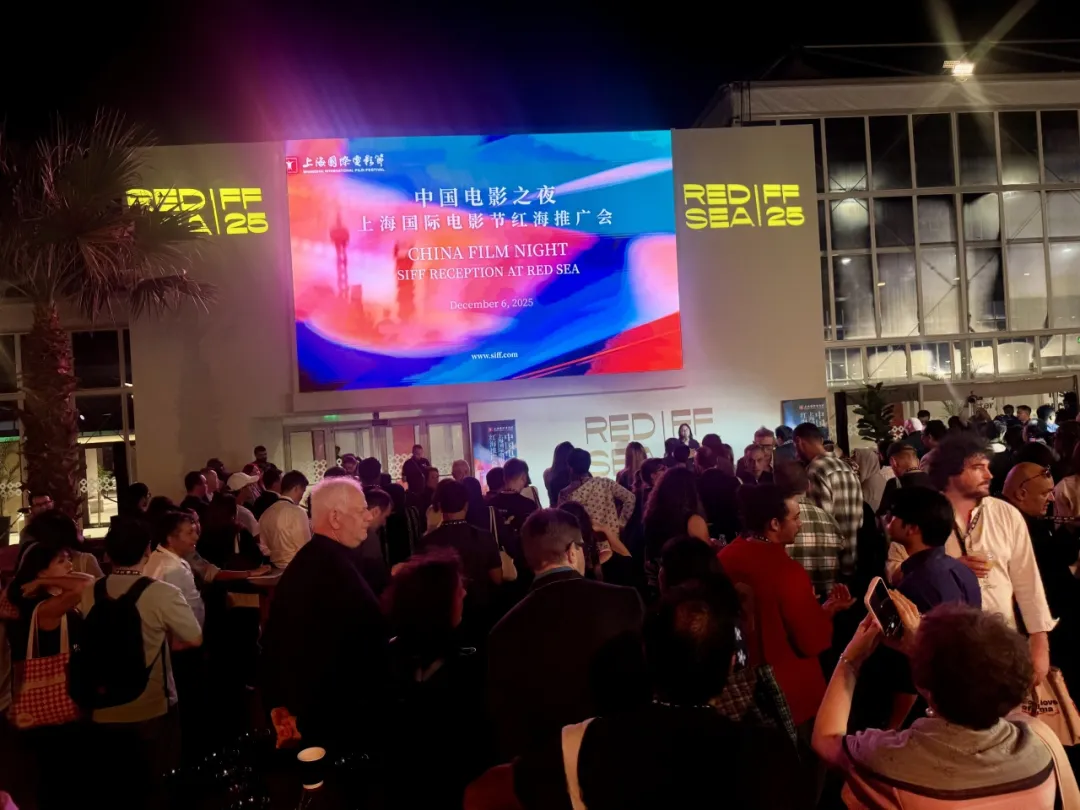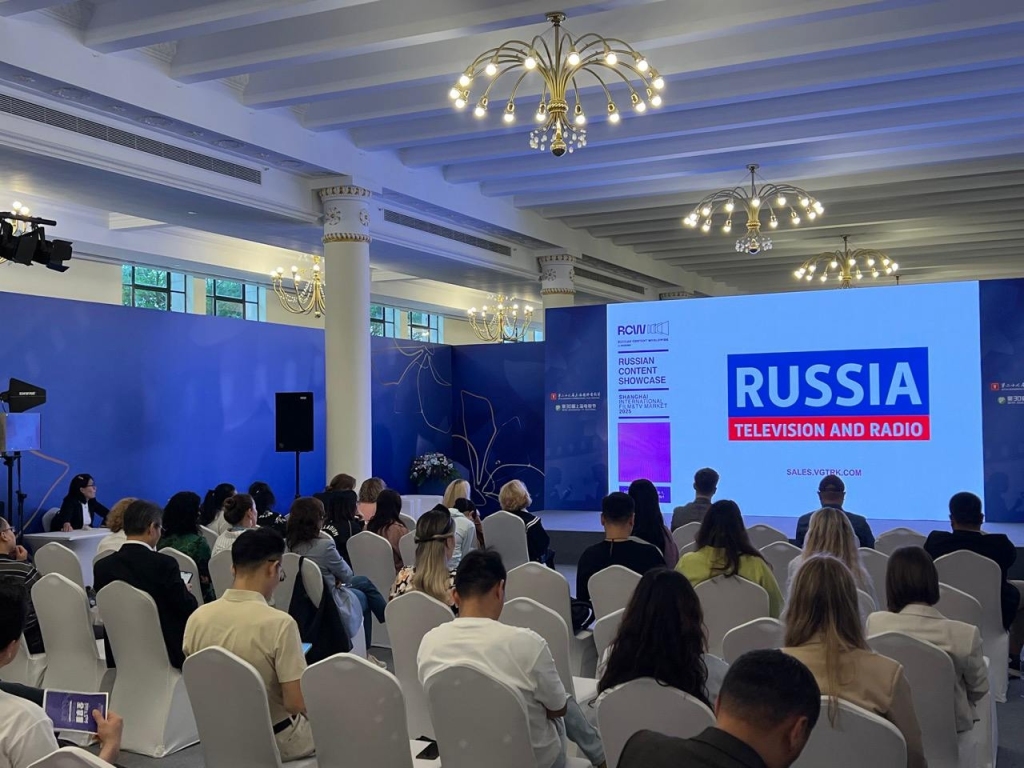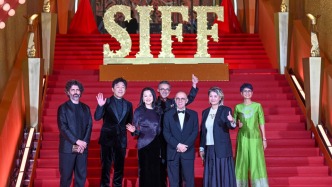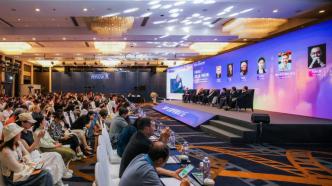
On June 16, the opening forum of this year's Shanghai International Film Festival was held with the theme of "A New Beginning for the Road of Light and Shadow". Every year, the main forum of the Shanghai International Film Festival always focuses on the most important industry guests and discusses the topics that the industry is most concerned about.
Bona President Yu Dong raised a question at the forum, "The next decade will be the most critical decade for China to move from a major film country to a powerful film country. What else can we do for Chinese films?" Although this sentence was said in the context of introducing Bona's upcoming projects, the core question of "what else can we do for the film industry" actually became the core of discussion throughout the forum.
This year's forum attracted heavyweight guests such as Alibaba Pictures President Li Jie, IMAX China CEO Meng Danqing, Light Media Co., Ltd. Chairman Wang Changtian, China Film Association Vice Chairman, Shanghai Film (Group) Co., Ltd. Party Secretary and Chairman Wang Jianer, China Media Group Vice President and China Film President Ying Xujun, and Bona Film Group Co., Ltd. founder, chairman and president Yu Dong to participate in the discussion.
Actively respond to and embrace industry changes
In the first half of the forum, the guests first "reported" on their work in the past year and exchanged their views based on their own industry practices and observations.
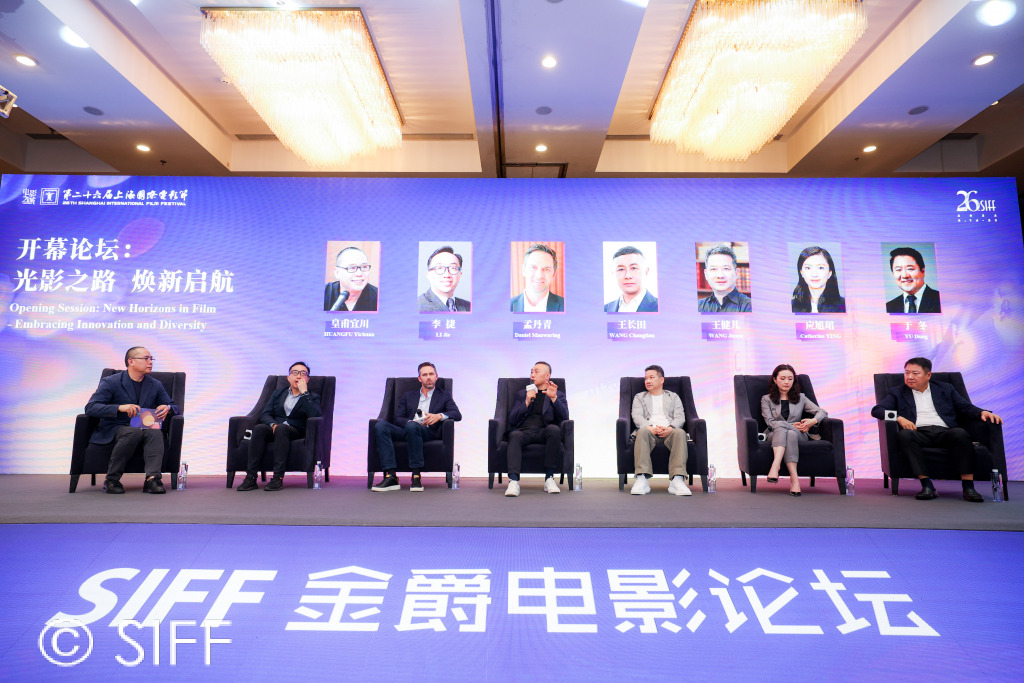
Shanghai International Film Festival Opening Forum, first half
Wang Changtian, who has been focusing on commercial genre films in the film market for many years, talked about some of the problems facing the current Chinese film market. Wang Changtian pointed out that there are obvious irrational phenomena in the genre structure of the Chinese film market. Specifically, the proportion of genre films such as animation and science fiction in the overall box office is too low.
"Compared to the international market, especially developed markets such as the United States, where the share of animated films in the box office is usually between 15% and 20%, in China, this proportion is only 7% to 8%, and sometimes as low as 4% to 5%. Even in the best years, the share of animated films in the box office is only about 15%. At the same time, he believes that the output and quality of Chinese science fiction films are relatively backward. "Although The Wandering Earth has been a success, overall, the number and influence of Chinese science fiction films each year are still insufficient. Science fiction films not only represent the level of a country's film industry, but also have huge market potential."
Later, Wang Changtian revealed a big news, saying that the new "Three-Body" movie jointly produced by Light Media and Three-Body Universe will be directed by Zhang Yimou.
Li Jie, president of Alibaba Pictures, shared his observations from the perspective of a technology company. "The audience's value propositions and aesthetic trends change dramatically within 6-12 months, while the film production cycle is usually 24-36 months, which makes it difficult for filmmakers to keep up with the audience's short-term changes in a long period of time." Therefore, Li Jie pointed out that "how can filmmakers keep up with the audience's short-term changes in a long period of time?" This will undoubtedly be a big challenge. Alibaba Pictures has some preliminary judgments on this and will explore it in the upcoming "Chinese-language blockbuster" plan. "Maybe it will take a few years in the future to prove whether the decision made today is correct."
Yu Dong of Bona Film Group also came prepared. He talked about Bona's future plans to focus on overseas stories of Chinese films, and the plan is also a trilogy. "The story of Chinese entrepreneurs on Wall Street that Bona is developing is comparable to The Wolf of Wall Street. The struggle of national security intelligence personnel to catch spies overseas and fight on the covert front is comparable to The Bourne Supremacy, etc."
Yu Dong pointed out, "More international expression in genre films is what Bona needs to work on in the next few years. The international expression of Chinese overseas stories may be a direction for our future efforts. I hope that after Chinese films become profitable in the domestic market, they can continue to expand their influence and radiation and export capabilities in overseas markets."
Faced with changes in audience viewing needs, even IMAX, which has the most powerful hardware, needs to make changes.
IMAX China CEO Meng Danqing emphasized at the forum that IMAX has successfully attracted audiences who did not often go to theaters in recent years by introducing diversified content, such as concert movies and live sports events. This attempt not only enriched the theater's viewing experience, but also inspired theater operators to expand content types to increase audience stickiness and the overall attractiveness of the theater.
Meng Danqing introduced that IMAX previously held an NBA game in Taiwan and Hong Kong, China. "It was very popular, and 100% of the tickets were sold out. I heard that the local theater chain told me that 80% of the participants in that event were people who had not been to the cinema for three years." The Taylor Swift concert movie co-produced with Alibaba also brought many young fans who had not been to the cinema for a long time back to the cinema. "Some people have not been to the movies for a long time, but they came because of Taylor Swift's concert. We hope to promote some diversified content to attract another group of audiences to watch movies."
Is AI a tool or a partner?
The Shanghai Film Festival Forum, which focuses on industry hotspots, is of course eager to talk about the hottest AI at the moment.
Is AI just a tool?
Ali Pictures President Li Jie believes that AI technology and virtual shooting are changing the way movies are made, improving production efficiency and reducing costs, but they will not change the essence of film creation, as creativity and creators are still the core. "Although AI provides new possibilities for creation, film is still an art with creativity and creators at its core." Ali Pictures currently uses AI technology in multiple projects, including large-scale application of AIGC technology in TV series and movies to optimize text, video, special effects and post-production.
Ying Xujun, vice president of China Media Group, also talked about how China Media Group widely uses AI technology in its animation division Oriental DreamWorks to accelerate the design and production of animation characters and scenes. She added that AI at the current stage mainly provides creative and technical assistance, but as technology develops, AI will make film and television creation more popular and democratic, giving more ordinary people the ability to create. "AI has been used a lot in animation production, but it is still mostly in the early creative assistance stage."
IMAX China CEO Meng Danqing emphasized that AI can help optimize equipment and diversify content, but it can never replace human innovation. "No matter how well AI develops in recent years, it will never replace a person's creativity." IMAX is studying the use of AI technology to optimize live broadcast and streaming resolution, and plans to apply AI technology in future sports events and concert films to provide a better viewing experience.
"It is unrealistic to have excessive expectations for AI, and it is also unrealistic to panic," Wang Changtian said. "Movies are centered on creativity, and AI can only be used as a tool to improve efficiency."
Wang Jianer, Chairman of Shanghai Film (Group) Co., Ltd., believes that the power of AI should not be underestimated, and it should not be seen as just a tool, but as a "creative partner". Wang Jianer mentioned that in practical applications, AI has been able to inspire people, "We think our own creativity is very important and the best, but we also have to admit that sometimes you will find another result very good, even better than you originally imagined, which brings us a kind of creative inspiration. So I wonder if it will become a trend to make AI our creative partner, not just a tool."
Wang Jianer said that Shanghai Film Group has a very open attitude towards AI and is currently trying to use AI technology for film creation. It has also established an AI creation center at the newly purchased Haopu base in Chedun to explore more possibilities of AI in film creation. In addition, Shanghai Film Group also plans to use AI technology in the Antarctic-themed movie "Snow Dragon" to achieve more realistic scene reproduction.
Yu Dong is also one of those who actively embrace AI. He said that AI will bring major changes to film companies. "What we used to call materials and engineering files may all be digital assets in the future." Bona Film Group has established its own AI studio, starting with short films and image creation, and gradually accumulating digital assets. Whether it is the "Legend" that will be released in the summer, which will allow Jackie Chan to return to his "peak state" in his twenties, or the conversation he will have with himself 25 years ago at the next Bona press conference, Yu Dong is very excited.
Drawing a blueprint together, Chinese films seek a new chapter of global vision
In the second roundtable discussion, the guests discussed the "going global" of Chinese films, as well as global industry cooperation and observations. Director Guan Hu, who returned from Cannes with honors, shared the common emotions of movies across the East and the West from his own creative experience.
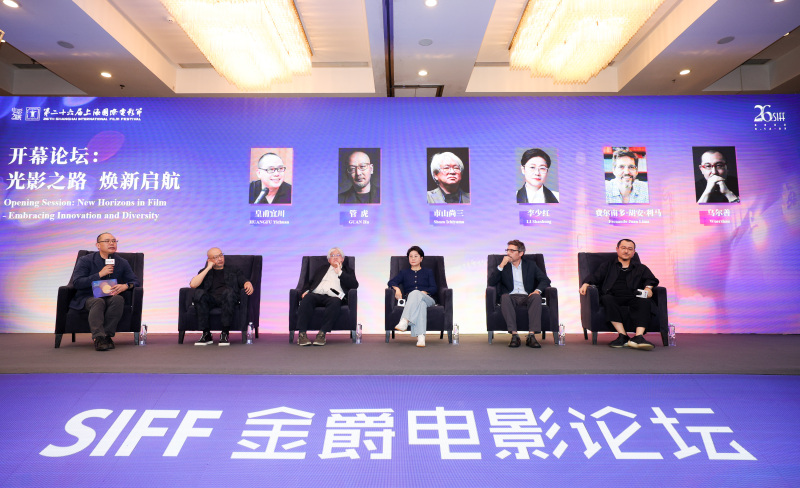
The second half of the Shanghai International Film Festival Opening Forum
Ying Xujun, vice president of China Media Group, said that Chinese companies and Chinese filmmakers must actively and comprehensively participate in the entire cycle of world cinema with an extremely open attitude. Only then will they have the power to negotiate with international production companies, international producers, international directors and actors.
Ying Xujun gave an example, in the process of shooting the film "Decoded" with IMAX, the crew needed the participation of heavyweight American actors, but during the shooting and preparation period, there happened to be a strike by the Hollywood union. Since Chinese are members of various industry associations in the United States, we used our resources, connections and experience to negotiate with the American Screen Actors Guild in an extremely clever way, and thus negotiated a very good American actor. "Only by actively participating can you become a member and better understand the pattern and ecology of world cinema."
At the same time, Ying Xujun shared the innovative attempt case of "China-led + international resources" at the forum. Taking the "Megalodon" series of films as an example, the film was developed by a Chinese company, which purchased international IP and cooperated with Warner Bros. in the United States. Through the integration of screenwriters, producers, directors and actors around the world, it successfully created a blockbuster for the global market. This model not only enhanced the international influence of Chinese films, but also demonstrated the competitiveness and creativity of Chinese films in the global market.
Whether it is facing the technological innovation brought by AI or the expression of different cultures when movies go global, for the creators, in the final analysis, the most important thing is to maintain sincere and independent artistic expression. The filmmakers at the forum reached a consensus on this point. Guan Hu emphasized that film creation should start from the heart and sincerely express the inner world of the creator. He believes, "Try to listen to the voice that flows from your heart, and then work hard to do this thing, I believe it will definitely go global."
Director Li Shaohong pointed out that the key to film creation is to truly reflect the life and reality of the creator. "It is most important that you understand yourself, your life, and your reality. You may not be able to express it in a deliberate way."
Wuershan talked about his experience of participating in the Chinese Film Week screenings of The Investiture of the Gods Part I in different countries. "The feedback from the audience was that they were moved by the emotions between the father and son in this story. This was the core inspiration and the strongest emotional motivation for me to create The Investiture of the Gods at the time. I think there is no barrier to this. No matter which culture we come from or what race we are, we are all children, we all have our own parents, and we will become parents of others in the future. This kind of family relationship is the most basic emotion of human beings, so it is completely consistent at this level."
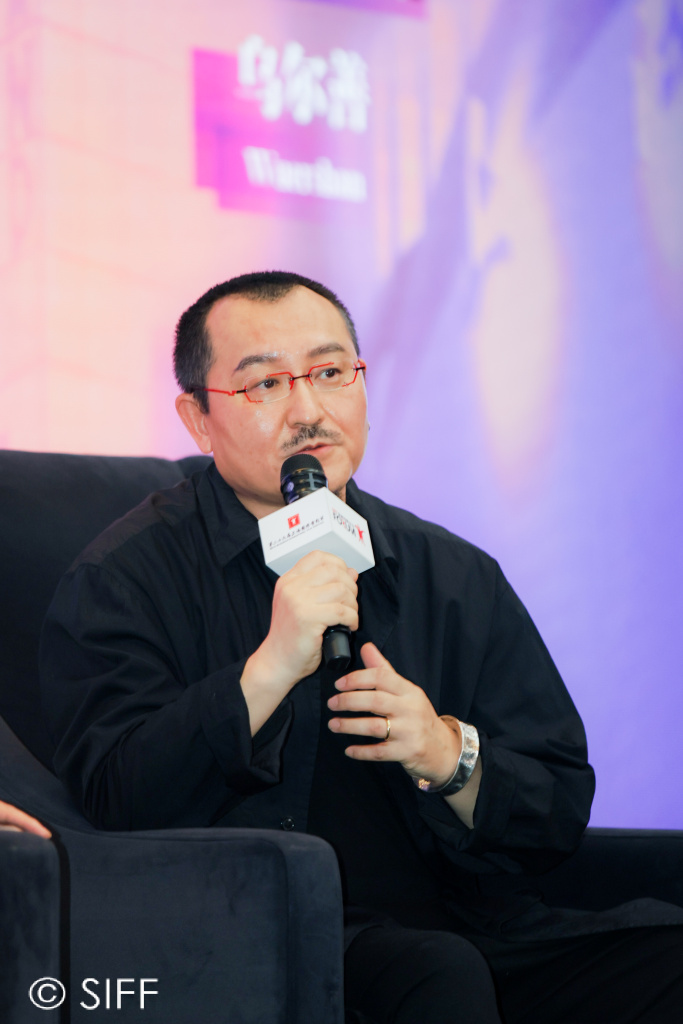
Wuershan
Partners from overseas film festivals also gave their opinions on the active demand for Chinese films to "go overseas".
Naozo Ichiyama, program director of the Tokyo International Film Festival, pointed out that "the international market is gradually accepting films from different cultural backgrounds. This is a good opportunity for Chinese films." He also reminded that "when making a film, don't rush to consider the international market, but keep your original intention in mind to make high-quality and excellent films. Later, when it goes overseas, if its quality is good enough, it will be recognized by overseas audiences."
